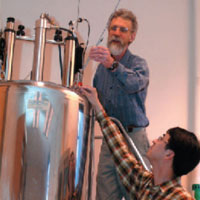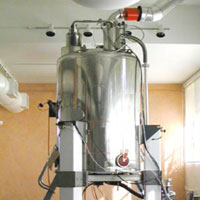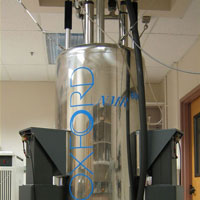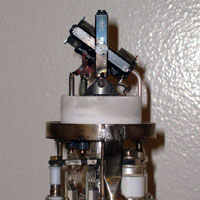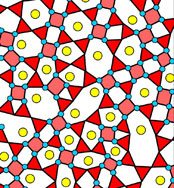Laboratory Equipment
NMR spectrometers and probes
The Stebbins group operates two solid-state NMR labs. The console of our 1987-vintage "400 MHz" spectrometer (wide-bore 9.4 T magnet) was upgraded in 2003 to a three-channel Varian Infinity Plus system with complete solids equipment including a 2 MHz data acquisition system, 1 kw broad band and 1H amplifiers, and new 3.2 mm double resonance and 4 mm triple resonance probes. Several home-made static high T NMR probes can reach temperatures up to 1500 °C. A relatively new high T MAS probe (Doty Scientific, Inc.) works well at temperatures to about 700 °C with sample spinning rates to 5 to 6 kHz at either 9.4 or 14.1 T field. These and other "wideline" and high speed (to 25 kHz) MAS probes, allow a wide range of modern solid state NMR experiments. A specially designed 4 mm rotor probe (Doty Scientific, Inc.) with low 19F background and spinning rate to 25 kHz allows collection of high-quality data for 19F as well as lower frequency nuclides.
Our second main spectrometer is a system with a 14.1 Tesla, "widebore" (600 MHz 1H frequency, 89 mm bore) magnet, installed in 1998. The spectrometer has three full radiofrequency channels, with high-powered pulse amplifiers on all and 2 MHz digitizers, and is fully equipped for most modern, double- and triple-resonance experiments. Probes include wideline and 7.5, 5, and 3.2 mm MAS probes set up for triple or double resonance. The latter probe, in particular, has excellent power handling capability, high sensitivity for small samples, and a spinning rate up to 25 kHz. We also have routine access to a fully-equipped 18.8 Tesla (800 MHz 1H frequency) instrument in the Stanford Magnetic Resonance Laboratory of the Stanford Medical School. We have a 3.2 mm double resonance MAS probe for this system as well as a high power single resonance 3.2 mm probe, which yield excellent results for nuclides such as 11B, 17O, 25Mg, 27Al and 35Cl.


